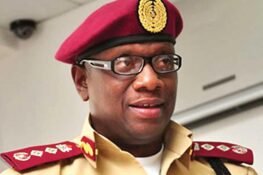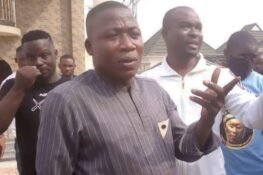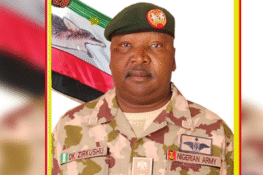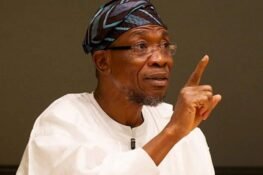Dr. Larry Izamoje is the chairman/CEO of Brila Group. In Thisi, he discusses his vision and mission in pioneering sports radio in the country, the journey so far and why the nation’s football house remains a war zone, among others.
What were you thinking when you started Brila FM 14 years ago?
To contribute to national development through sports; to get more people magnetised to sports; to bring our people advancements in sports in the developed world and that way get more people inspired to aspire to greater heights through sports; also, to give vent to my passion: all my life it’s been sports, sports, sports.
How much of these goals have you achieved in 14 years?
I have derived, and still get great joy talking sports. People say when they hear the name ‘Brila”, sports pops up in their minds. I want to believe there are people out there that have been inspired by our special stories on the poverty-to-megabucks stories of champions.
Most start-ups in Nigeria face serious problems of capital. How did you raise money to pay for licence, buy a transmitter and get an office?
We started by renting a very small office. We were the only radio station in Lagos operating from a rented apartment. We also sought good but unpopular equipment from manufacturers looking to market in Nigeria at that time, and so they sold cheap. We were independent producers on 15 radio stations long before the licence was granted, working for blue-chip companies. Applying and getting the licence took three years so we had time to save well. My wife added almost everything she had financially, and when it was still not enough, my elder brother, Dr. Innocent Izamoje, came in. But the key was starting small in a rented office.
Did they make the contributions as loans or equity?
I invited them to co-own it. It was not a family or man and wifelove-tinged arrangement.
You went into radio at a time when TV was getting bigger and bigger; and let’s face it, most people would rather watch sports than listen to it. What competitive edge did you think you had?
There was no sports radio on the continent and interest in global sports was growing. Our research showed people wanted those pre- and post-event stories TV never gives. They needed a platform to talk about what they saw on TV. It was a pioneering effort.
What were three of the toughest challenges you faced starting out and how did you tackle them?
One was acceptability because sports radio was new. Another was, and still is, the rickety power problem; and three, getting those on the mission to see the full picture. For acceptability, we added music whenever we talked sports, so we gave listeners the music they enjoyed on FM and added sports. Every three to six months we reduced our music content and increased our sports content, seeing the love for more sports content was increasing. We made PHCN our third source of power supply by depending on two generators and a big UPS. Those who were working with us as independent sports producers were given key roles. We recruited only sports-savvy people and constant in-house training was done for them.
Did you approach any leading sports personality to invest?
No, because attending the Rick Scott/ESPN Sports Radio conference in San Diego, USA, before we started, we were told that we must keep our vision and not allow investors seize the boardroom. A lot of the stations in the USA at that time were not owned by leading sports personalities; they were just owned by businessmen who came out and wanted to just do things professionally. And with the strategy to start small, we did not need huge funds. I saw radio stations in portacabins in the USA.
 You have been a sports journalist all your professional life; do you share the view that beat associations, like SWAN, foster corruption? Are your staff members of SWAN?
You have been a sports journalist all your professional life; do you share the view that beat associations, like SWAN, foster corruption? Are your staff members of SWAN?
It depends on how you look at it. I refuse to say that SWAN as a body fosters corruption. No, far from it, but there are rooms for improvement.
What specific areas of improvement do you have in mind?
To truly determine entry levels and membership grades, constant training, conduct and disciplinary procedures and generally make members the watchdogs the profession calls for and not to be too close to those they watch.
You are a journalist and a successful entrepreneur. Not many journalists seem to be able to do both very well. Why do you think that is so?
Doing business in Nigeria is like passing through the valley of death, very demanding in every sense of the word, and, sadly some journalists have gone into businesses without planning for them. To survive before struggling to succeed, your business must be solving a problem, filling a void; you must have your unique proposition and unique selling point. For us, it is sports.
What five key success tips would you share with journalist-entrepreneurs?
Number one: Project into your area of passion. Passion gives rise to action. If you’re not passionate about an area of life, don’t go into it. Your determination will die.
Number two: Plan well. Have a strategy, your uniqueness.
Number three: Practicalise your plan driven by passion. Note that as you practicalise, you must persist and persevere. Leave a room for praise and prayers, that is, a quiet time you have with God knowing full well that when the storms come, you just find strength knowing you are not alone. Also prioritise. Sadly, in Nigeria you find somebody becoming an entrepreneur and labels himself/herself CEO and has a secretary when he/she does not even have clients.
Brila FM broadcasts from Lagos, Abuja, Kaduna and Onitsha. How difficult is it to maintain content quality?
It used to be tough but, thanks to technology, you find that everywhere today the Brila brand is the same We have our own in-house rules and a central pool where we decide topics that go on air; so presenters may be different in the various cities but say the same thing the Brila way.
You are quite close to former Rivers State governor, RotimiAmaechi. Is it true that he helped you fund the start-up of some of your stations?
No. He did not. To so insinuate is being unfair to our toil and moil in the murky waters of business in Nigeria. Quite close? That is relative and I leave that to you.
So, what is your relationship with him?
We served on the Presidential Task Force that took Nigeria to the world cup in 2010. I also like his doggedness as a person. Although we don’t get to see or even talk as it was in the PTF days, I still admire him till this day.
Some would say you can’t control the resources of a state like Rivers and not be dogged?
I mean the way he fought for his mandate, going on exile at a time and as far as the Supreme Court. I like people who battle rightly when they feel cheated, perhaps because I was of the Marxist league in my UNILAG years. See how he came out of all he faced with the last administration.
It is believed in some quarters that radio is public service; that it does not make enough money? What has your experience been?
Radio indeed does not give you the kind of money you expect, it is not a big money spinner, but did we set out to make big money when we entered radio? No! We set out to give vent to our passion and to contribute to national development through sports service, to cause people to be inspired to aspire to higher heights. We are just living our dreams and if food is on the table through living our dreams, we thank God.
So, how much are you making, roughly?
Making money? Our sector is badly hit given the economy now and we are just managing to stay afloat, really struggling.
Sports betting is growing quite fast in Nigeria, with a Vanguard report claiming that stakes are as high as N1.8billion daily. Is this a good thing?
Speaking religiously, I’ll say no, but professionally I would say the constitution allows freedom of movement and association, so if somebody constitutionally decides to associate and/or move with a betting company, who is Larry Izamoje to say it is bad?
So, will you accept adverts from betting companies?
Yes. We accept. Sports betting is heavy on sports radio in the advanced world.
Is Brila FM making money, especially with over 280 FM stations in the country?
The economy is bad globally and Nigeria is beginning to feel the pinch because of the fall in oil prices with its spillover effect on businesses, advertisers, patrons and others. Business is tough everywhere and broadcasting is not spared.
How exactly has it affected Brila Sports?
When companies cannot produce, what will they advertise for? When cutting jobs is becoming the order, and states find it difficult to pay salaries, advertising takes the back seat. That is where we find ourselves, but we pray for Nigeria.
Do you think Internet radio will be a problem to legacy broadcasting?
It will not immediately be because of the literacy level, the purchasing power of the average Nigerian, high cost of data services or even the cost of devices in Nigeria. It is not something to make anybody worry, at least not for now, not in the foreseeable future.
 Apart from radio, you are also involved in printing, publishing and marketing. Are these subsidiaries profitable?
Apart from radio, you are also involved in printing, publishing and marketing. Are these subsidiaries profitable?
I would rather not use the word profitable. Larry Izamoje, family and colleagues have never gone into anything looking for profit. We give vent to our passion, living our dreams. The printing business is managed by my wife, a trained printer and publisher whose passion is in that area.
Nigeria has had three national coaches in two years. The search for a national coach continues. Would you support a foreign coach?
No, if it’s the same average foreign coaches that cannot get a good club to coach in Europe and who now look to Africa for the next meal. It comes down to the quality of coach, the terms of service and work environment. Except a proven, high grade FIFA grade, a tactician and when we have the right conditions for a coach to excel. As things are now, very good foreign coaches cannot last here if they take our job.
Why?
Conditions here are still not right: assured salary payment, non-interference, the relationship between the NFF and Sports Ministry, departments and committees of the NFF, to other vested interests.
What three major steps need to be taken to improve the quality of our local league?
One is funding. Two, joint ownership like it is done in the EPL where the clubs partly own the league. Three, improved administration of clubs as business entities.
For the first time in the history of the African Nations Cup, Nigeria will be absent back to back. Did you see it coming?
I feared for Nigeria when Egypt equalised in Kaduna but I still believed that in Alexandria luck was just going to be on our side. May God never allow it happen again to our country.
How could it have been avoided?
It could have been avoided if we planned better administratively going into the series and not having to give coaches three weeks on caretaker basis to perform miracles. If we transformed our team to a gang long before we faced them (Egypt), we could have avoided it. It could have been avoided if we held out for a 1-0 victory in Kaduna. It also could have been avoided if we were not too cautious in Alexandria.
Do you think Sunday Oliseh should have been hired in the first place?
There was nothing wrong with Oliseh being coach because he showed knowledge of the game before being appointed,and given what the NFF had as salary and posture of superior powers on hiring indigenous coaches, the NFF could not look elsewhere. Oliseh played the game at the highest level, and there are countries and clubs that had taken ex-captains who had played at the highest level. It’s like asking if ZinedineZidane should have been hired coach of Real Madrid. Where had he coached to handle mighty Real Madrid? But for Oliseh, a few things just went wrong between him and players, between the NFF and him and the working conditions. So it was not whether he should have been hired, but whether those things that created gaps could have been avoided. What you must do before employing people is to first look at what they are bringing to the table and to agree terms and procedures. I still think it was not harped that as coach you must work with the technical committee and technical department of the NFF. It was so with Keshi. There should have been nothing wrong spelling it out to him thatsalaries may at times be delayed but will eventually be paid. A lot went wrong concerning the whole process; it is better forgotten so that our football can move forward.
You have worked in a number of local and international sports committees. Which one do you find particularly striking and why?
Working as member of the Presidential Task Force that took Nigeria to the World Cup in South Africa 2010. Striking, because the World Cup was coming to Africa for the very first time and the late president, (Umaru) Yar’Adua had told us, ‘You must make Nigeria play at the World Cup.” And every night we went to bed saying if we miss this opportunity, we would not have only failed Mr. President but Nigerians and ourselves. So it was very striking when the task was accomplished. It was also striking because the committee returned money to the federal government – never heard of in sports service – and at the end of the day, the then president, DrGoodluck Jonathan, approved that the money be used to build a football house for Nigeria and our names are on the new football house at the Abuja Stadium for selfless service.
What is the problem with the NFF and what is the most urgent solution?
The problem with the NFF is government’s money, not individuals really, because if you keep honey without bees around them, people will go there and lick. If you keep a big cake without it being guarded, people will go there and cut. So I think the problem is government’s money. If government can de-emphasize the kind of money it gives to the NFF, if people know that they are going there to face corporate Nigeria and source funds, people will not be rushing, pulling and pushing to get in there. Let them be truly autonomous with government only partly taking care of serious international competitions with the first grade scrutiny of demands and you will see. Also, most ex-players should note that the NFF is not the only place to look to for their future.
You have a content partnership with the VOA. What Nigerian content do they get from you in return?
We had an agreement with VOA to take our online content, especially during the World Cup when we were also giving them some materials from Nigeria. Apart from content, they also support us with equipment and training. Last year, Sonny Young of ‘The Sonny Side of Sports’ visited our Lagos and Abuja stations. The year before he was with us in Lagos as well. So they have helped to make us better. They also sent a team just before the World Cup last year to discuss digital media and website management. If you know the gains of such interface – given our specialized nature and the cost of training, you will help us thank God.
You are the fourth child in a family of nine. Did you feel squashed growing up?
I never felt so. My dad and mum had the same rules and the same stick for every child. They taught hard work, having integrity and remaining humble.
At what point in your life did it become clear to you that you would become a journalist?
At the point I broke my leg playing for my hostel, MakamaBida Hall, in UNILAG. I decided to start running commentaries while others were playing; so, misfortune led to fortune. That was in 1983, so you see, I have been on the pavement for years.
Injury forced you out of active football, to become a commentator. Do you regret not rising to become a football star?
Not at all, not with the joy I derive talking sports.
Do you think today’s editors are demanding enough from their reporters?
The same cannot hold for all editors. I’d rather advise today’s reporters (although some are doing very well): you bring the biggest story from the deepest pit. Muckrake, go the extra mile, do the extra bounce even if not pushed to do so. Do not compromise. My Bible says, do everything you have to do as if working for God.
Will Brila become a dynasty or are your children looking elsewhere?
It is our prayer and hope that one of them will be sufficiently interested to take it, along with staffers who remain loyal to the vision, to the second generation maybe by just setting up a first grade management while pursuing their own dreams.
Are they showing any interest already?
We are showing them reasons to, but careful not to kill their own dreams. It is a gradual process
As a businessman, what keeps you awake at night?
Moments before God and our mission statement, which says we must at all times be the first for sports loving listeners, their most authoritative source, and their reference point in sports casting in Nigeria.
Messi, Ronaldo or Neymar? Who is your player of the year 2016?
I do not see players from a confined footballing perspective. As someone that is more marketable – Ronaldo. As someone with infectious humility – Messi, and being the youngest and proof you can aspire and mix with the best – Neymar. They all bring something to the table for me.
If you had to choose one?
Messi, because he does not work as hard as Ronaldo to impress. It comes to him with ease.
What will Brila Sports become in the next 10 to 20 years? What’s your next move?
We build one block every day. We are looking at how digitization will impact the current broadcast landscape. We are looking at emerging opportunities following digitization, the challenges that will come, and we will act appropriately, God helping. We have also been working on a TV station without walls, an online station we call brilasports.tv.
Share with us three experiences that shaped your life?
The strict discipline of dad and mum growing up, the knowledge of God as the Almighty and complete surrender to Him, and how the misfortune of a broken leg led to sports talk and business.








